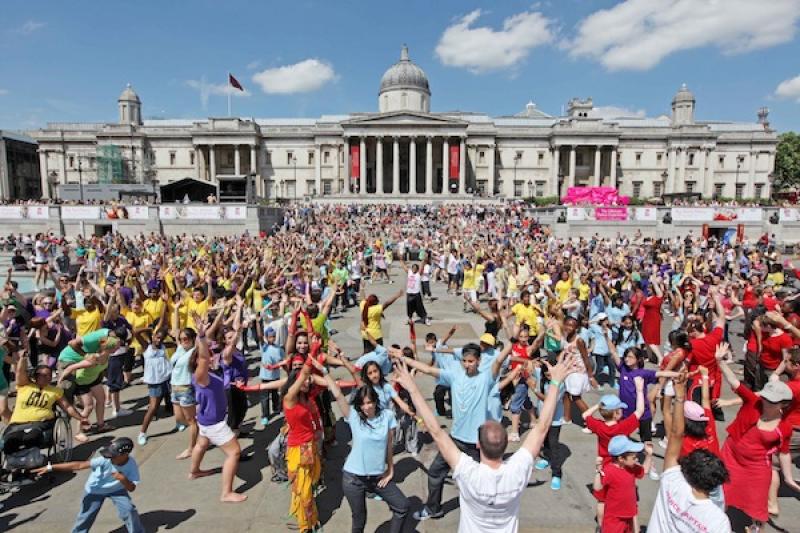Cash for arts: should it be bums-per-pound or pounds-per-bum? | reviews, news & interviews
Cash for arts: should it be bums-per-pound or pounds-per-bum?
Cash for arts: should it be bums-per-pound or pounds-per-bum?
New music support body on defensive as Britain's composers attack en masse

The organisation that channels public money to generate today's new classical music has been resoundingly condemned this week by all of Britain's most important composers.
The letter, published on Tuesday, accuses Sound and Music (SAM) in the frankest terms of a "bland and unfocused endorsement of sound art" and "fringe activities" rather than a focus on its remit to invest in risk and composers.
Yesterday Sound and Music fought back, saying that despite taking a 42 per cent hit on the money it has to play with, it has started up new schemes aimed at children and developing young composers which will take time to show results. But it admits to a lack of leadership, with a new CEO and other officers still in the process of being appointed. It argues that SAM is a new creature anyway, trying to incorporate the main elements of four previous bodies closed by the Government, but with a refreshed outlook.
What's telling, as I read the two documents, is that the accusations and the responses don't meet. There's a crevasse that separates their rationales, and which is opening up fast now through Britain's lyrical arts-without-words, the "difficult" ones. While the composers appear to think the purpose of the £700,000 subsidy is to provide the resources for the advance of new composition and aspirants in the "higher/difficult" end of music, the Sound and Music mitigation highlights what it's doing with children and "tools" for young and early composers on the nursery slopes of all sorts of "sound art", including what you might call "lower/easier" kinds of music from jazz and improvisation to alternative rock and folk. The fusing of the four old groups in SAM (the Society for the Promotion of New Music, the Contemporary Music Network, the British Music Information Centre and the Sonic Arts Network) appears to have given rise to a significant shift in purpose, possibly while the composers weren't noticing.
You could see it as a sell-out by intimidated bureaucrats who have no confident engagement with the stuff they're supposed to be pitching for
This is emblematic for the way that all arts funding appears to be shifting - away from developing and enriching the practice and creation of a demanding classical art, and developing the scope of art "access" and widening its base.
From one view, you could see it as a sell-out by intimidated bureaucrats who haven't any confident engagement with the stuff they're supposed to be pitching for. Or, from another view, it's an intuitive (and Government-backed) response on behalf of "ordinary" people to a kind of creativity that doesn't have the mass appeal that it ought to have. It's that old "them" and "us" argument again.
Both, in fact, are good causes. Somewhere on the way it has stopped being a given that public funding is there to feed niche experiments and rigorous peculiarities as well as larger familiarities. In a less classically literate UK, and with the rationale of public spending coming under very hard political pressure, being "difficult" to access is much more of a handicap in culture, it seems.
Of course, one aim is much more measurable in results than the other. An "access" scheme or an "education" kit can tidily be put into spreadsheets for annual reports: 20,000 young people from 100 schools went to this, 20,000 students downloaded that, 100,000 people nationwide participated in the other - whereas even an award-winning mainstream classical recording may sell as few as 6,000 copies in two years, and a composer as august as Judith Weir, Maxwell Davies or Harrison Birtwistle may only be able to show that their new opera was seen by 10,000 people (and it might not be seen again).
This disconnect is precisely applicable to the area of contemporary dance, too. On Wednesday the trade paper The Stage reported that a third of the choreographer companies who lost their public funding in last year's cuts have closed. The others are weak or changing tack. Some of them would struggle to find even 5,000 audiences in a year, yet some of that talent (choreographer Henri Oguike, for example) is exceptional. But look at the "participation" and "access" end, where Britain joins its hands in dance and waggles its overweight rear to celebrate "community", and there you'll find the money going in bucketloads.
For the number-crunchers, keen to maximise bums-per-pound, "access" funding must make for an easier life than the much more controversial judgment of pounds-per-bum.
Explore topics
Share this article
Add comment
The future of Arts Journalism
You can stop theartsdesk.com closing!
We urgently need financing to survive. Our fundraising drive has thus far raised £49,000 but we need to reach £100,000 or we will be forced to close. Please contribute here: https://gofund.me/c3f6033d
And if you can forward this information to anyone who might assist, we’d be grateful.

Subscribe to theartsdesk.com
Thank you for continuing to read our work on theartsdesk.com. For unlimited access to every article in its entirety, including our archive of more than 15,000 pieces, we're asking for £5 per month or £40 per year. We feel it's a very good deal, and hope you do too.
To take a subscription now simply click here.
And if you're looking for that extra gift for a friend or family member, why not treat them to a theartsdesk.com gift subscription?

Comments
I'd like to know how many